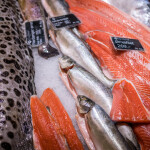A recent committee meeting started the discussions on a bill introduced by U.S. Rep. Jared Huffman (D-California) to combat illegal, unreported, and unregulated (IUU) fishing and slave labor in the seafood supply chain.
The bill, H.R. 3075, was covered during a recent meeting of the Water, Oceans, and Wildlife Subcommittee of the House Natural Resources Committee. It would enact the expansion of the Seafood Import Monitoring Program (SIMP) to cover all seafood and seafood products - the program, initiated in 2016, originally included tuna, king crab, blue crab, red snapper, Pacific and Atlantic cod, dolphinfish, grouper, sea cucumber, swordfish, and sharks in its coverage requirements, with shrimp added in 2019.
Titled the “Illegal Fishing and Force Labor Prevention Act,” the new rule would both expand SIMP and require seafood importers to include additional data in their reporting – including location of catch and electronic reports of chain of custody – that would need to be submitted and verified by competent authorities at “all major transfer points in the supply chain.”
“Illegal, unreported, and unregulated fishing, or IUU fishing, is a serious global problem,” Huffman said during the hearing. “As we’ve discussed previously in this subcommittee, IUU is closely linked to financial crimes, fraud and mislabeling, human trafficking, and forced labor.”
Huffman said a recent U.S. International Trade Commission report found that 11 percent of total U.S. seafood imports in 2019 – or USD 2.4 billion (EUR 2 billion) worth of seafood – were products of some form of IUU fishing.
“Not only is this contributing to overfishing and slavery at sea, it’s undercutting honest American fishers who play by the rules and operate some of the most sustainable fisheries in the world,” Huffman said. “The Illegal Fishing and Forced Labor Prevention Act addresses IUU fishing comprehensively. It improves the Seafood Import Monitoring Program by expanding its requirements to all species, increasing data requirements, improving detection of imports at risk of IUU fishing and labor violations.”
In addition to the expansion of SIMP, the bill also has a second section devoted to improving the labeling of seafood as it passes through processing and distribution. The program would require labels including information on:
- Where the seafood was caught or cultivated;
- The acceptable market name, scientific name, and specific Aquatic Sciences and Fisheries Information System Number for the species;
- Whether it was harvested in the wild or was farm-raised;
- The method of harvest, including gear type;
- The date of the catch or harvest and the weight or number of products for an individual fish or lot;
- Date and name of entity which landed the seafood;
- Name and flag-state of vessel and evidence of authorization, and if applicable a unique vessel identifier;
- Name and location of the facility from which farm raised seafood were harvested, the method of cultivation, source and type of feed, and evidence of authorization;
- The NOAA Fisheries International Fisheries Trade Permit number issued to the importer, if applicable.
At the committee hearing, Huffman also pressured National Marine Fisheries Service Assistant Administrator Janet Coit as to whether the NMFS plans to update its definition of IUU to include forced labor. H.R. 3075 contains an update of the definition, but Huffman said the legislature has pushed NOAA to update the definition, without success.
“Ms. Coit, you may be aware that Congress has directed NOAA several times now to expand the very limited definition of IUU fishing that the agency has been using so that it would include forced labor and human rights violations,” Huffman said. “Most recently, in fiscal year 2021 and our appropriations bill, we directed NOAA to revise that definition within 90 days after enactment. That omnibus appropriations bill was enacted on 27 December, but to my knowledge, we have yet to see an updated definition.”
Coit, who started at NOAA just a few weeks before the hearing, said that she was unsure of the timeline for the draft rule.
“I will be honest that I am not sure when that will emerge from the process,” Coit said. “The decisions on the definition are not NOAA’s alone to make. It’s part of a conversation across the administration, and I know that that conversation is happening now.”
Huffman’s bill, introduced in May, is the latest effort in an ongoing push by the U.S. federal government to crack down on forced labor in the U.S. seafood supply chain. In 2020, the government issued 15 withhold-release orders on goods and that trend has continued in thus far in 2021, with several foreign vessels and seafood companies hit with WROs.
Experts predicted in March that U.S. Customs and Border Protection (CBP) would step up enforcement of rules intended to prevent forced labor. That prediction was reflected in U.S. CBP action against a Fijian tuna longliner just last week.
Environmental non-governmental organizations have called for the expansion of SIMP as a tool to stop IUU. In May, Oceana criticized the current limitations of SIMP and called for the expansion of the program to cover all seafood species sold in the United States.
The seafood industry, however, has been vocally opposed to any expansion of SIMP, claiming that it hasn’t performed well enough at its intended roll of addressing IUU fishing.
“The program has not proven its mettle in any way, and it generates job-killing compliance costs and headaches for our companies,” National Fisheries Institute Vice President for Government Affairs Robert DeHaan said. “There are far better ways to address IUU fishing. We look forward to continuing to make our case against this badly flawed regulation.”
Photo courtesy of the Water, Oceans, and Wildlife Subcommittee







